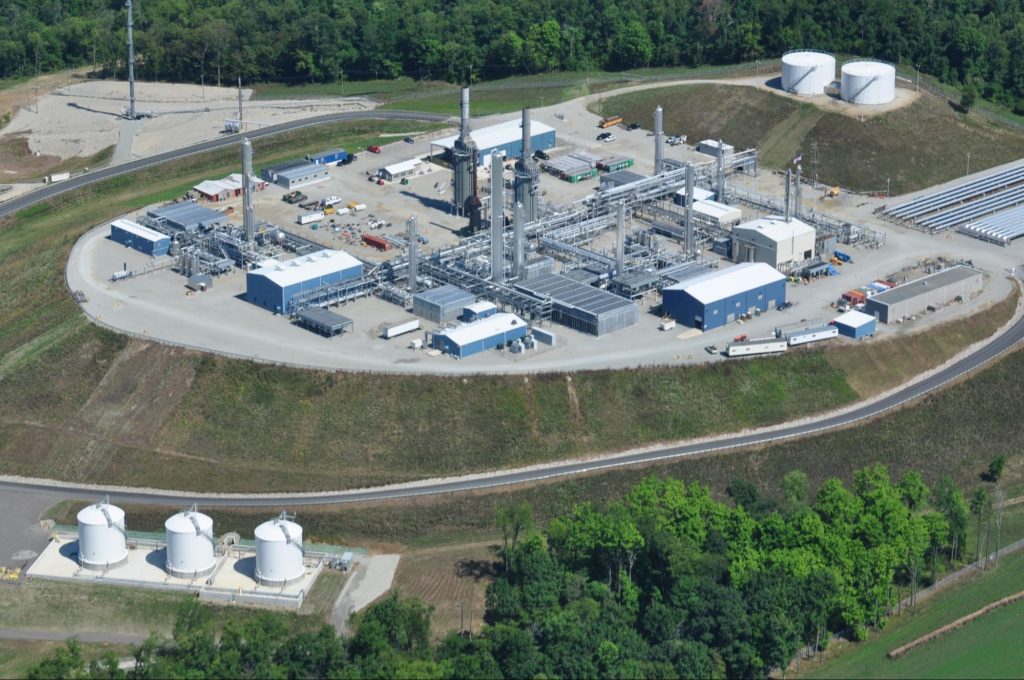Oil and Gas

Introduction
Every stage of oil and gas operations, from production and extraction to processing and distribution, releases air pollution. This negatively affects public health and exacerbates the climate crisis. Clean Air Council calls for a rapid transition away from natural gas for electricity generation and plastics production, but also advocates for policies that address health and climate concerns right now.
The Problem
Oil and gas operations, including fracking, emit air pollution that is known to be harmful to human health and the environment. Numerous studies have found that living or working in close proximity to natural gas infrastructure has negative health impacts, and that there is an increased risk to health the closer a person lives to it. Over 1.5 million Pennsylvania residents live within a half mile of active oil and gas wells, compressors and processing plants, but millions more people who don’t live near oil and gas operations feel the devastating effects of oil and gas pollution.
Methane, an extremely potent greenhouse gas, is the main part of natural gas and is directly fueling the climate crisis. Methane leaks across every stage of the oil and gas supply chain, and creates ideal conditions for extreme weather and deadly heat in every zip-code.
Major cities like Philadelphia and Pittsburgh experience high summer temperatures that can be unsafe and deadly for residents. Methane emissions fuel this “heat island” effect which disproportionately impacts low-income areas and communities of color where there are often fewer trees, greenspaces, and a legacy of social oppression and environmental racism that are compounded by extreme heat.
Pennsylvania has a major methane pollution problem, and it’s only getting worse.
The Solution
While we push to quickly stop using natural gas throughout our society, there are a number of important ways to better protect health and curb climate change. Pennsylvania can adopt strong rules that require oil and gas companies to look for and repair methane leaks, which add up to a staggering amount of climate pollution. Local governments can pass rules that keep oil and gas infrastructure away from where people live, work, and play.
Current campaigns
- Cut Methane PA: The Council partners with a network of organizations in a campaign urging Governor Wolf and the Department of Environmental Protection (DEP) to adopt a rule to cut methane and volatile organic compounds (VOCs) from existing oil and gas infrastructure. Governor Wolf and the DEP’s draft rule exempts wells below a certain threshold of energy production from any common sense inspection requirements to find and fix leaks. That would result in tens of thousands of wells across Pennsylvania continuing to leak unchecked. These wells collectively contribute more than half the methane pollution from oil and gas infrastructure in Pennsylvania.
- Protective Buffers PA: The Council coordinates an eight-member coalition of partner organizations to implement a campaign to secure local ordinances and state policy changes that limit the impacts of shale gas and petrochemical facilities through setbacks. A setback is the minimum distance required between a proposed structure and an existing structure, boundary, or natural resource. The Council is engaging the public to persuade elected officials to establish science-based minimum setbacks between oil and gas-related infrastructure and important natural resources such as wetlands and creeks, as well as to prevent the infrastructure from being too close to where people live, work, learn, play, and worship.
Take Action
- Contact Governor Wolf to urge him to close an industry loophole in his proposed oil and gas air quality rule
- Contact your representatives and urge them to support protective buffers to keep oil and gas infrastructure away from our homes, schools, and streams!
Recent successes
- Worked with Marianna Borough, an environmental justice community, to draft an ordinance that would keep fracking 1,500 feet away from homes and 2,500 feet away from schools (2021).
- Convinced the Pennsylvania Department of Environmental Protection (DEP) to adopt strong permit standards for air pollution from new and modified wells and related operations (2018).
- Convinced West Pike Run Township in Washington County to adopt stronger oil and gas rules that included a 1,000-foot setback between the infrastructure and schools and homes (Summer 2018).
- Convinced Trafford Borough in Westmoreland County to pass an ordinance restricting gas development to industrial areas and within a half mile from the property line of schools (March 2016).

